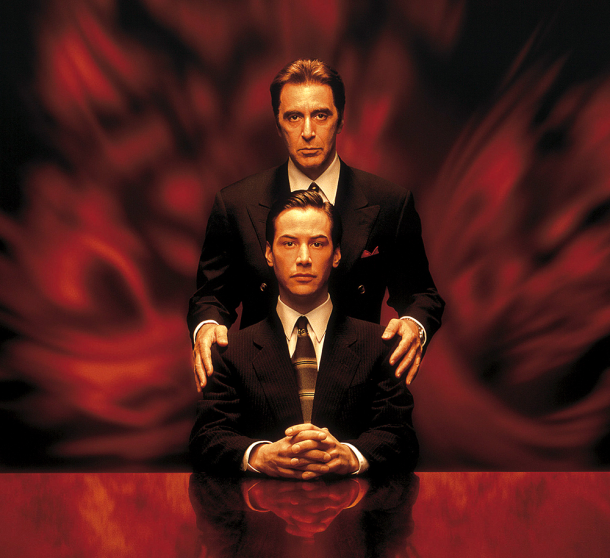
From the 1997 film
by Jamal Stone
The facts:
Broad Street Magazine’s “Bedeviled” issue draws closer than ever to publication, Halloween is less than a week away, and The Devil’s Advocate recently has been picked up as a TV series by NBC.
This raises a question: Rhetorically, a devil’s advocate is someone who argues for argument’s sake, but what exactly is a devil’s advocate? While you consider how much candy to buy for the trick-or-treaters, Broad Street investigates.
To some of us, The Devil’s Advocate recalls Keanu Reeves’ eternally wrinkle-free face. In his sort-of-classic 1997 film, also starring Al Pacino, Reeves plays Kevin Lomax, a tenacious defense lawyer who wants to win at any cost. With a strong portfolio and weak moral compass, Lomax is summoned to NYC to work for a Mr. John Milton, who most certainly is not Satan in disguise. The film’s blend of horror and legal drama is equal parts American Horror Story and Suits—its TV reboot is a no-brainer for NBC.
The movie suggests that a devil’s advocate is some sort of aide in Satan’s court, similar to Mephistopheles in Goethe’s Faust. In that early-19th-century tragedy, Mephistopheles is “the Spirit of denial, the impersonation of that utter skepticism which can see no distinction between high and low, between good and bad.” An “utter skeptic” would likely be contrarian to a fault, just like a devil’s advocate. Right?
No. Mephistopheles and Kevin Lomax are advocates, and they do work for the capital-D Devil, but they are not devil’s advocates in the literal sense.
You see, it turns out that devil’s advocate used to be an actual full-time job, held by actual people, until relatively recently. Until the title was retired in 1983 by Pope John Paul II, the devil’s advocate was found at the Vatican. When considering a candidate for sainthood, the Catholic Church goes through the process of canonization, in which the credentials of the deceased are heavily scrutinized. Prior to John Paul II’s decision to ban the title, professional devil’s advocates—employees of the church—argued against the sanctity of the candidates, questioning the truth of their miracles and their devoutness. The cynicism necessary for such argumentation is translated into our common understanding of “devil’s advocate” as a perpetual debater.
Satan is traditionally a pretty good arguer. His name from Hebrew even comes from the word “to oppose,” and there is little question to whom he is opposed. In J.B., Archibald MacLeish’s free-verse retelling of The Book of Job, Satan, recast as “Nickles,” consistently questions J.B.’s commitment to God:
Bought and paid for like a waiter’s smirk!
You know what talks when that man’s talking?
All that gravy on his plate—
His cash—his pretty wife—his children!
Lift the lot of them, he’d sign another canticle to different music.
MacLeish’s modernized version is brief, dark, and has a lot of fun breaking the fourth wall. His work on the play eventually won him a Pulitzer Prize. (Also, he was the librarian of Congress, which is a fine job itself.)
Do devil’s advocates violate the truth? It seems that our modern definition hinges on belief —it doesn’t matter if the devil’s advocate is right, rather what matters is that the devil’s advocate doesn’t believe in whatever he’s arguing for. As we inch toward “Bedeviled,” perhaps we should consider the good and the ill in devil’s advocacy—and eat a lot of high-fructose candy.








